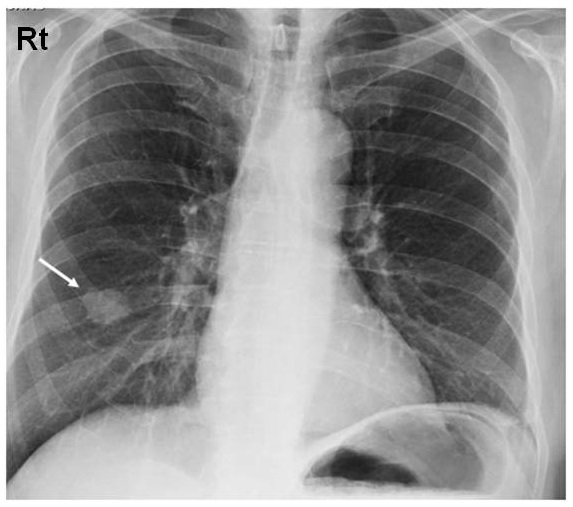By Adebowale Bello. B.Tech Microbiology. Freelance Health Writer. Medically reviewed by the DLHA Team.

Chest X-Ray showing a lung nodule at arrow in the right lower lobe.
Breathing easy is something we often take for granted until something feels off.
For many Africans, the thought of lung problems seems reserved for those diagnosed with pneumonia and tuberculosis or to heavy smokers and those exposed to extreme pollution.
Recent insights however reveal that even seemingly healthy nonsmokers also need to be vigilant about lung health. This is because having lung nodules (otherwise known as spots or shadows in the chest) may in few cases forewarn of serious lung issues like cancer.
Lung nodules are tiny, round growths that can appear in your chest, whether you are a smoker or not. These nodules are often discovered during routine chest X-rays or CT scans and may raise alarm bells.
While most are harmless, a few could signal the early stages of lung cancer, underscoring the importance of awareness and timely medical checks.
A new study sought to describe the features of lung nodules in a nonsmoking adult population and discuss lessons learnt.
The study was conducted in Northern Netherlands and involved over 10,000 individuals who had either never smoked or had quit smoking. Using low-dose CT scans of the lungs, the researchers uncovered some intriguing findings about lung nodules.
42% of the participants had at least one nodule and men were found to be more likely to have them than women, with 47.5% of men having nodules compared to 37.7% of women.
Age was also a key factor. The likelihood of developing lung nodules increased with age. For instance, in the 45-49 age group, approximately 39% of men and 28% of women had nodules. In stark contrast, the 80+ age group saw these figures rise to 61% for men and 51% for women.
The size of the nodules was also significant. While most nodules discovered were small at less than 30 cubic millimeters or 3.9 mm in diameter (i.e., less than the size of a pencil eraser) and posed little threat, around 11% of participants had "clinically relevant" nodules (i.e. size averaging between 5 - 25 mm diameter), which required further investigation. More concerning was the finding that about 2% had "actionable" nodules (i.e. size averaging above 25 mm diameter) – necessitating urgent follow-up due to their lager size.
The study further revealed that individuals who had quit smoking were more likely to have lung nodules than those who had never smoked. Although quitting smoking is beneficial, it does not entirely eliminate the risk of lung health issues.
The presence of a lung nodule does not automatically equalise to cancer as they can result from past infections, scar tissue or other non-cancerous conditions. However, the study highlights the importance of regular health check-ups for lung nodules especially as we get older.
While the study was conducted in Europe, its findings are globally relevant as they remind us that lung health is a universal concern. In Africa, where the focus might be more on infectious diseases, understanding the risks associated with lung nodules is vital.
If you or anyone you know experience persistent cough, new breathing difficulties, chest pain, fever and chills, or unintended weight loss of 10 lbs or more, don’t dismiss them even if you’ve never smoked. Talk with your healthcare provider to learn of any concerns. Former smokers should continue to prioritize their health through regular check-ups. For current smokers, quitting remains one of the most impactful steps you can take to improve your lung and overall health.
Source: Cai, J, Vonder, M, Pelgrim, G. J, Rook, M, Kramer, G, Groen, H., de Bock, G & Vliegenthart, R (2024). Distribution of solid lung nodules presence and size by age and sex in a northern European nonsmoking population. Radiology. Published online August 13, 2024. doi: 10.1148/radiol.231436. Available from here.
Published: August 28, 2024
© 2024. Datelinehealth Africa Inc. All rights reserved.
Permission is given to copy, use and share content for non-commercial purposes without alteration or modification and subject to source attribution.
DATELINEHEALTH AFRICA INC., is a digital publisher for informational and educational purposes and does not offer personal medical care and advice. If you have a medical problem needing routine or emergency attention, call your doctor or local emergency services immediately, or visit the nearest emergency room or the nearest hospital. You should consult your professional healthcare provider before starting any nutrition, diet, exercise, fitness, medical or wellness program mentioned or referenced in the DatelinehealthAfrica website. Click here for more disclaimer notice.